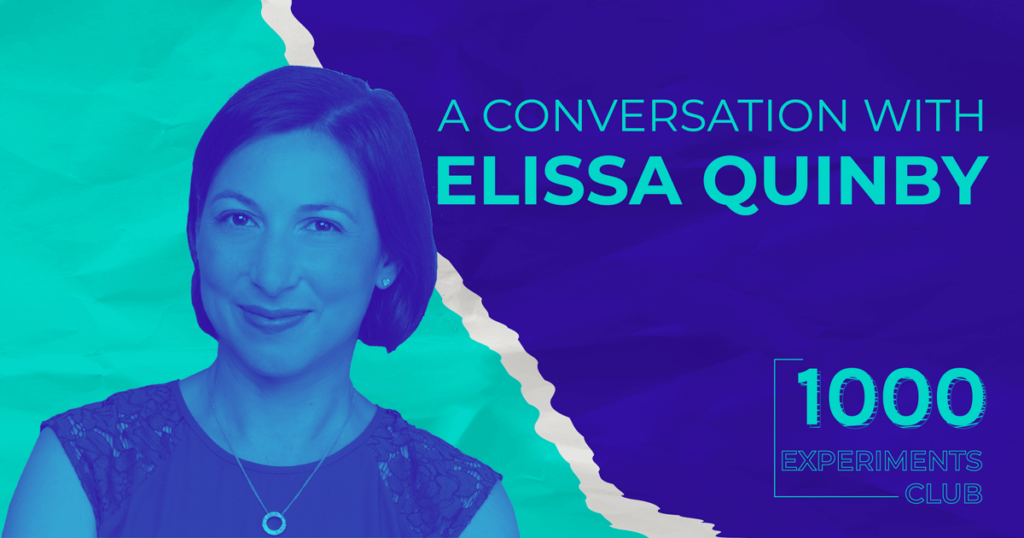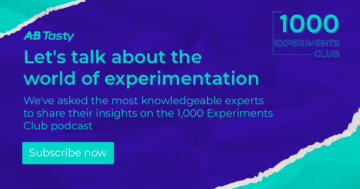Elissa Quinby explains why a frugal mindset around experimentation can actually accelerate the process and increase resourcefulness.
Elissa Quinby lives and breathes retail, with eight years under her belt at Amazon working across multiple business units and functions on the marketing and product teams, as well as prior positions at Google and American Eagle Outfitters.
Currently the Senior Director of Retail Marketing at Quantum Metric, an experience analytics company that helps brands to gain insights about their customers and make rapid, data-driven decisions, her expertise has been put to good use for the past year.
AB Tasty’s VP Marketing Marylin Montoya spoke with Elissa about ways to encourage loyalty from customers, methods for experimentation and how even the smallest piece of data can have a huge impact on tailoring the customer journey for a better overall experience.
Here are some of the key takeaways from their conversation.
Start with ONE key piece of data from your customer and use it to build brand loyalty.
As marketers, we know the value of our current customer base, given the time, effort and cost of acquiring new customers. So it’s only logical to focus on improving the user experience in order to encourage repeat shoppers.
During her time working at Amazon, Elissa adopted a mindset of frugality and learned how much of an impact can be made with only one piece of customer data. Today, she challenges retailers to ask themselves what data they already have that could revolutionize their customer experience.
With first-party data being the “secret sauce,” Elissa recommends starting small and offering value in return for their cooperation. Customers are increasingly hesitant to share their information with brands, so it’s important to offer an enticing incentive that will allow you to gather that one valuable piece of data that will improve the consumer experience.
The hardest part of gathering that vital first-party data is encouraging customers to create an account. Once a customer has a profile, trust can be built over time and more data can be gathered, but always in exchange for value. For example, you can encourage customers to sign in to shop by offering personalized filtering or search results. This creates a more efficient and enjoyable online shopping experience for your customers as a reward for their loyalty.
“There’s literally nothing that should not be experimented on.”
Experimentation should be at the core of every marketing strategy. In a process of continual improvement, the possibilities for optimizing the customer journey are endless, however data is the only way to know for sure which modifications to pursue.
With an emphasis on speed, the idea of experimentation is to test a new solution as quickly as possible, releasing any attachment to perfection, in order to start collecting customer feedback.
Elissa explains that any new feature must be tested before it launches. Until customers offer feedback via their interactions, it remains a simple hypothesis to be proven. Not only does this save time on development, but you can gauge the user response to the experiment and make the necessary adjustments.
The experimentation process is precise, methodical and data-driven, to ensure the experiment is set up correctly for a reliable and insightful result – regardless of its success or failure.
As the majority of tests do fail, it’s important to fail fast in order to learn as quickly as possible from the customers’ reaction. Elissa explains that running tests multiple times with slight adjustments can help to pinpoint the issue, which might be as simple as where in the customer journey a prompt is showing up.
Experimentation tools can help brands optimize customer experience.
While manual methods for testing can yield results, an experimentation tool can supercharge your customer experience optimization.
An experimentation tool not only saves time, but also ensures you are getting the most out of each test. It begins with data-driven ideation for the best hypotheses, and if your test fails to meet target metrics, a tool will allow you to pivot by ensuring that you have another hypothesis at the ready, also backed by data.
Secondly, being able to pinpoint why an experiment failed, with comprehensive analysis, is key to improving your results without exhausting your resources.
Finally, an experimentation tool can offer real-time data. If your experiment isn’t tracking well, you’ll know immediately and can shut it down. Conversely, if it’s a winner, you can start working with the product team to launch the new feature. It allows innovation cycles to be sped up, with decisions based on real-time data analysis of the user journey and browsing behavior.
By optimizing the experimentation process with an intelligent analytics solution, you can improve efficiency and quickly hone in on features that are going to bring meaningful improvement to the customer experience and therefore drive results for the company.
What else can you learn from our conversation with Elissa Quinby?
- How to do more with less resources (both time and money)
- How to stand out from competitors via a loyalty program
- Why you should leverage digital during all phases of the customer journey
- Why all customer insights play a vital role in improving business results
About Elissa Quinby
Elissa Quinby is an expert in retail insights, starting her career as an Assistant Buyer at American Eagle Outfitters followed by two years at Google as a Digital Marketing Strategist. She went on to spend eight years at Amazon across multiple business units and functions including marketing, program management and product.
Today, Elissa is the Senior Director of Retail Marketing at Quantum Metric, an experience analytics company that helps brands to gather customer insights which drive intelligent decision-making.
About 1,000 Experiments Club
The 1,000 Experiments Club is an AB Tasty-produced podcast hosted by Marylin Montoya, VP of Marketing at AB Tasty. Join Marylin and the Marketing team as they sit down with the most knowledgeable experts in the world of experimentation to uncover their insights on what it takes to build and run successful experimentation programs.






